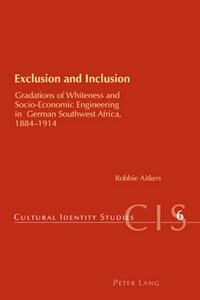
This book sets out to examine the internal workings of a colonial settler society drawing on aspects of post-colonial theory and whiteness studies. It focuses on the construction of a hierarchical social order in German Southwest Africa in the period 1884-1914. In doing so it explores the historical creation of categories of race and the construction of a concept of whiteness within white settler society in Germany’s foremost settler colony. In the colonial environment the presence of some settlers was deemed to be more desirable than others. As a consequence policies of exclusion and racial rhetoric were employed to exclude undesirable settlers from white society. What emerged was a pioneer society in which undesirable settlers were socially, politically and economically excluded whilst desirable settlers sought to forge a racially and culturally exclusive utopia. Based on extensive archival material from the Bundesarchiv in Berlin as well as a wide range of printed sources, the book presents an insight into strategies of social control, power, the establishment of social privilege and constructions of whiteness in a settler society.